A question that has repeatedly come during live coaching calls with my BYF members is whether other members plan to use LVT flooring vs engineered wood flooring in their new home.
In full disclosure, LVT flooring wasn’t even a consideration when I built my home in 2013 because it wasn’t a popular option that people talked about. So when my members started discussing LVT flooring, my first thought was … uh, what the heck does LVT stand for?
Being the little researcher that I am, I dove right into learning all I could about LVT flooring and, of course, I’m sharing everything I learned with you.
After reading this blog post, you’ll have the knowledge you need when you walk into the flooring store and are asked, ‘Are you more interested in LVT flooring or engineered wood flooring?’
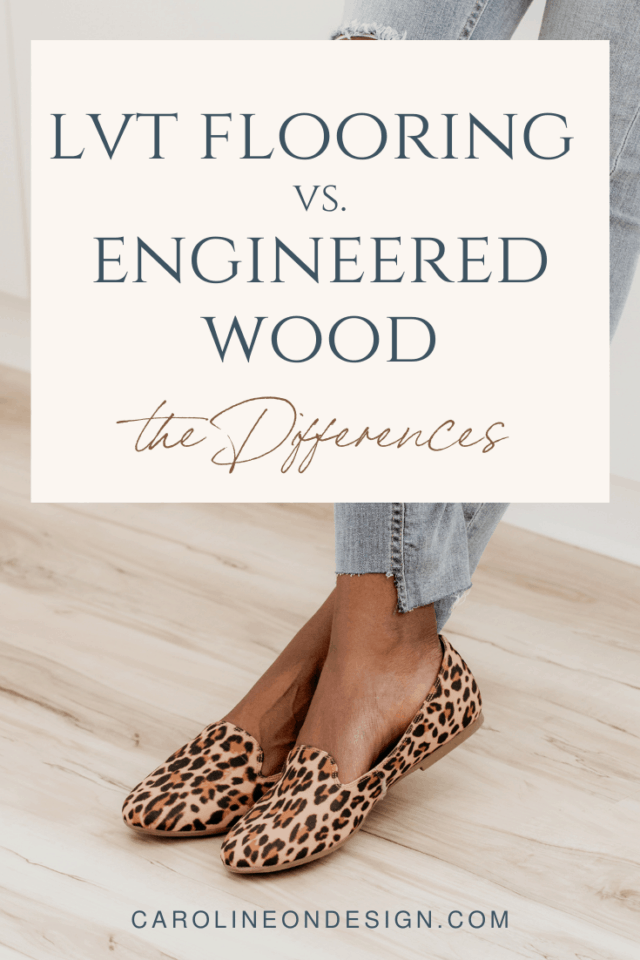
We’ll start with an overview of both LVT flooring and engineered wood and then we’ll compare the two options.
WHAT IS LVT FLOORING?
LVT stands for Luxury Vinyl Tile. It is manufactured to look and feel like real wood or stone while providing the benefit of being much more durable and practical than natural products.
Luxury Vinyl Tile is available in a wide variety of shapes and sizes so you are sure to find a product that resembles the natural flooring look that you are seeking.
LVT products are generally made of highly moisture-resistant PVC which results in an extremely durable product that is easy to install, clean, and maintain. Also, it is less susceptible to the negative effects of moisture and humidity and the surface is far more robust than real wood flooring so it typically won’t dent, chip, or scratch.
While LVT has the benefit of durability due to manufacturing with PVC, there is a definite drawback … PVC releases toxins that are hazardous to both humans and the environment. Keep this in mind as you make your flooring selections. There are some LVT products that are lower in toxins.
If installed and maintained correctly, LVT can last upwards of 10-20 years.
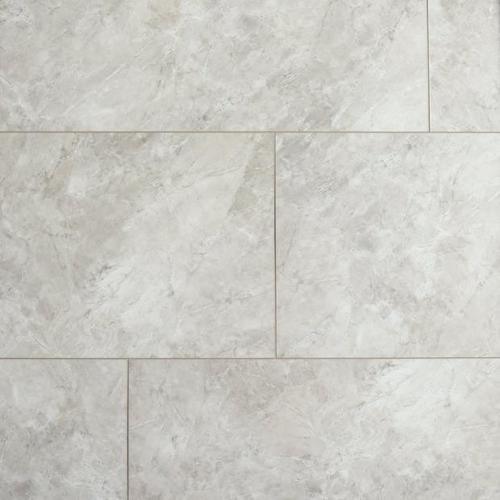
LVT Flooring via FLOOR & DECOR
WHAT’S THE DIFFERENCE BETWEEN LVT & LVP FLOORING?
LVP stands for Luxury Vinyl Plank. Vinyl planks are created to mimic wood plank flooring.
There is no difference between LVT & LVP other than the way the product is cut. LVT is cut to mimic stone tile and LVP is cut to mimic wood planks. Both are luxury vinyl flooring and both have the same level of durability and variety of options.
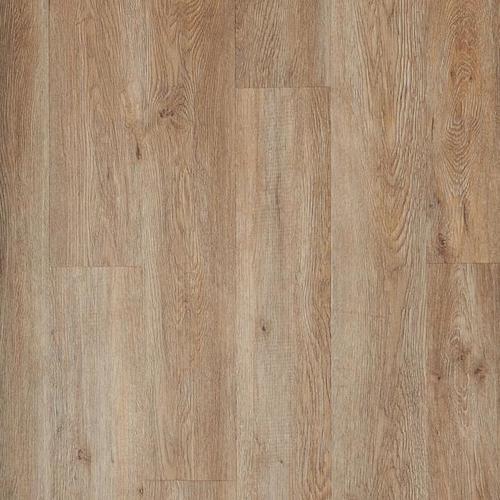
LVP Flooring via FLOOR & DECOR
PROS + CONS OF LVT FLOORING
PROS OF LVT FLOORING
- Nearly indistinguishable from the look of real hardwood and real stone flooring
- Much more affordable than natural products
- Much more durable than natural products
- Does well in rooms with high humidity and moisture
- Easy to install, clean, and maintain
- Less susceptible to denting, scratching, or chipping like natural products
CONS OF LVT FLOORING
- Not eco-friendly and releases toxins (look for a low toxin brand and product)
- Made with PVC which is hazardous to humans and the environment
- Shorter lifespan than real wood or stone floors
- Cannot be easily repaired
- Can be difficult to remove
WHAT IS ENGINEERED WOOD FLOORING?
Engineered wood flooring is partially made with real wood. It is constructed in layers, as opposed to a solid piece of wood.
It is slightly thinner (3/8” – ½”) than solid hardwood and is made up of layers. The top and bottom layers are 100% natural wood and can come from a variety of species (just like solid wood). The middle is constructed from several layers of plywood.
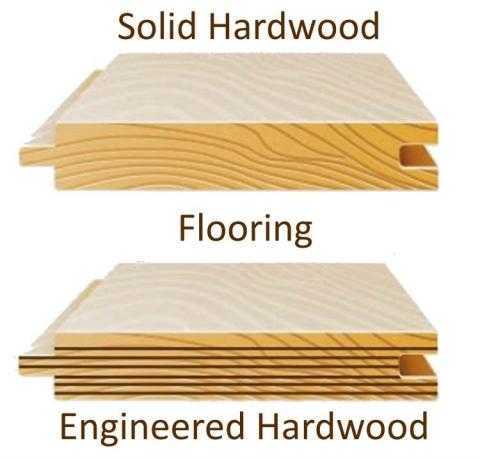
Image via PETER FLOORING
The thickness of the top layer varies depending on the product’s quality. A higher-quality engineered wood product has a thicker top layer; cheaper products have a thinner top layer.
The layered construction provides stability against environmental changes, so it isn’t as affected by humidity as solid wood is. It’s less likely to expand, contract, or shift when exposed to moisture, humidity, and temperature. Therefore, it’s a good option in rooms with high moisture (such as your basement or bathroom).
The one drawback to engineered wood is that it typically can’t be sanded and refinished. Some of the premium products can be refinished once or twice, but you have to be very careful.
Engineered wood flooring is typically less expensive than solid wood … unless you choose a premium product. Premium engineered wood products are similar in price to solid wood. It is much more expensive than LVT (luxury vinyl tile).
PROS + CONS OF ENGINEERED WOOD FLOORING
PROS OF ENGINEERED WOOD
- Top and bottom layers are made with real wood
- Looks and feels like real wood because the top layer is real wood
- More durable than solid wood flooring
- Comes in a variety of products, styles, and quality levels
- Not as affected by humidity and moisture as solid wood
- Can be far less expensive than real wood (depending on the quality level)
CONS OF ENGINEERED WOOD
- Can be as expensive as solid wood if you choose a premium product
- Typically can’t be refinished (unless a premium product)
- Not solid wood (but includes real wood layers)
- More expensive than LVT
You may also enjoy: Solid Wood vs. Engineered Wood Flooring
LVT FLOORING VS ENGINEERED WOOD
Both LVT and engineered wood flooring look and feel like real wood. However, only engineered wood is actually made with a top (and bottom) layer of real wood. Due to this layer of wood, engineered wood flooring is more susceptible to scratching, denting, and chipping than the more durable LVT flooring.
Engineered wood flooring fares better than solid wood in high moisture rooms (e.g. bathroom) BUT LVT is completely water-resistant so it is a better choice in rooms that are high in humidity and moisture.
LVT is far less expensive than engineered wood for both the product and installation. Some premium engineered wood flooring products cost as much as solid wood products. Even the lower-priced engineered wood products cost significantly more than LVT products.
LVT is typically less expensive (pro!) and more durable (pro!) than engineered wood but it poses a serious health and environmental risk (con!) due to manufacturing with PVC. You need to really do your research when it comes to selecting an LVT or LVP product to make sure the toxicity levels are very low.
The bottom line … both options are beautiful, look authentic, and come in a wide variety of styles. Choosing one over the other comes down to your budget, your durability needs, and your comfort level with the toxins that can be released from LVT.
I personally have (mid-level) engineered wood flooring in my home and love it. I would certainly consider (low toxin) LVT in a future home but at this point, I’m very happy with my engineered wood flooring and would probably choose it again over LVT as long as my budget allowed this.
I hope this post has helped you to better understand the differences between LVT flooring vs engineered wood. If you want to dive a little deeper and follow my guided approach to making design decisions for your home, be sure to download my *FREE* Design Decision worksheet!
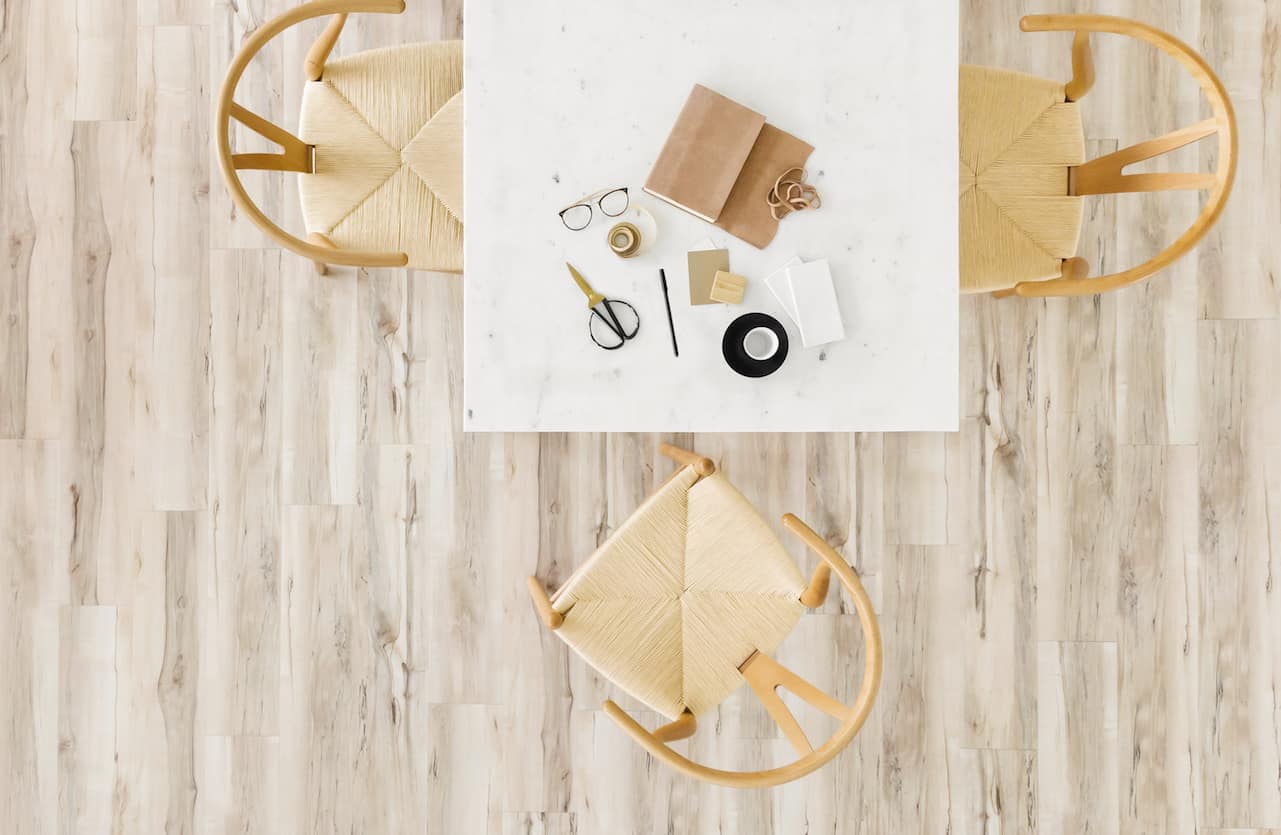
I’ve noticed nearly all the flooring show rooms I’ve visited have LVP on their floors. Looks great and must be quite durable to be used commercially.
LVP will probably be my choice for our new semi-custom build. I really would like the unbroken flooring flow throughout.
Thanks for noting how much more durable and affordable luxury vinyl flooring is in the long run. As someone who’s trying to save up a lot of money for a home extension project, I figured that being cost-effective with my choices will be a big help over time. With that in mind, since we’re going to start renovations soon, I’ll look for a vinyl flooring provider and have them install some for us.
https://www.bigbobsoutlet.com/instok-lvt
I had engineered wood floor in my house for 20 years and porcelain tile in my kitchen. I am not sure if I should use the engineered wood floor again or consider to change to luxury vinyl planks for both family room and kitchen. Please give me some idea.
That decision is entirely up to you, Cindy! It all depends on what pros and cons you lean toward (since both flooring types have both pros and cons). Good luck!
I would like to use engineered flooring for the upstairs of my home including 4 bedrroms and a hallway. Could you say what mid-level product you are happy with? I am so confused after looking at so many options. Thank you!
Hi Gretchen! Our engineered wood floors are Mannington brand and they are Mayan Pecan. I’ve been very happy with the Mannington brand and was able to find floors at a decent price point. Good luck!
I’m just starting a remodeling project. I’ve read the pros and cons of LVT vs Engineered wood flooring. My thoughts is that they both look good, but on large samples I’ve tried walking on bare feet, the engineered wood feels much more like wood and doesn’t seem as hard as the LVT flooring. Any thoughts on this?
Thanks
This makes perfect sense, Paloma, because engineered wood has real wood as the top layer (so it feels like walking on wood). LVT flooring is vinyl tile flooring, so it feels cold and hard like most tiles would feel. Best of luck with your remodeling project :).
Great article!
I’ve read from multiple sources that LVT feels warm on the feet compared to tiles and wood so a bit surprised by this comment.
Can you use a steam mop on LVT and engineer wood too?
That’s interesting that you read that. I feel like it’s cold on the feet. I guess it would depend on the brand and if you have heated floors. I am not a flooring expert, so you’ll need to ask a flooring expert about using a steam mop on LVT and engineered wood flooring. – Carrie
Regarding LVP, I have installed various manufacturers’ planks for varioua projects, and the best ones have cork backing, not foam. Cork backing is so much quieter and feels more like walking on real wood. Now that I have experienced both backing, I only will use cork backed.
Thank you for sharing this helpful advice, Jaimee!
Hi I am trying to remodel my home and my downstairs living room has engineered hardwood and some cheap vinyl that the builder put in the kitchen and upstairs bathrooms. Everywhere else is carpeted. I would like to take out the carpet (killing my allergies) and replace the cheap vinyl, but to use engineered hardwood I was told would be difficult because it would be difficult to find one that matched my flooring at this point..and cost is def a factor. Would it be wise to replace everything with LVP? I feel so confused and overwhelmed with this decision! Please Help
Hi Paula! I recommend that you go to a local flooring store (or 2) and meet with their experts to talk about your flooring options. I do agree that it’s very difficult to match new flooring with old flooring. Sometimes the best option is to replace it all, but that can get pretty expensive. So meet with someone local to figure your options (i.e. trying to match the new flooring to your old flooring VS. replacing all of your flooring) and the associated costs to do each option.
First, Bathrooms and kitchens almost never match the rest of the flooring in most middle aged to older homes. Because the materials like waterproof LVP until recently. Mine (1972) and later re-modeled have tile in baths and kitchen). Many homes have different flooring for high traffic hallways, entranceways etc. They also may have different treatments in bedrooms.
I think that if you keep your choices in the same family and similar shades, the changes will be easily dealt with. I’d try to come closest to a match with adjacent floors to the Living room–even going with a more expensive material would be offset by saving de-installation and replacement for the living room–as long as it is in great shape. BUT with bedrooms, usually lightly trafficked and frequently unlit and behind closed doors, often with area rugs, I think you have a chance to use long wearing, economical and easier to care material. That’s my thinking for my upcoming project.
I just bought a home with engineered wood flooring and I’m not sure how to clean it. I have read not to use a steam mop but I haven’t seen what you should use instead?
Hi Brittany! I have a blog post that goes over how I clean my own engineered wood floors. CLICK HERE to read this post. – Carrie
Thank you for this post, it’s very helpful! I was leaning toward the engineered hardwood but we are a dog and kid family, so I may be rethinking my decision. What is your personal preference on the width of the plank?
I have 32 years in the industry. I would never recommend LVT or LVP. If you look up customer complaints in the industry, you will find there’s a problem with the products. The most economical, long term product is either a solid wood floor or a premium engineered product. They can be refinished numerous times and with proper care last 100 years or more. The top end life span of LVT/LVP is 10 years and then you get to tear it out and send it to a landfill where it will never biodegrade. Do yourself a favor and look up the health issues associated with the product too. For a society that supposedly cares for the environment, they should ban the use of LVP/LVT.
Thanks for sharing this info, Jake!
I’ve lived with LVP for a couple years now. Who ever said it looks or especially feels the same is dead wrong. It looks and feels just as cheap as laminate wood flooring. Can’t wait to switch out this junk for real wood or premium eng. wood.